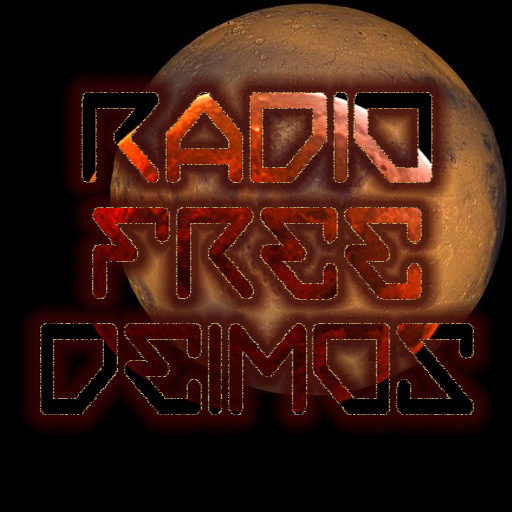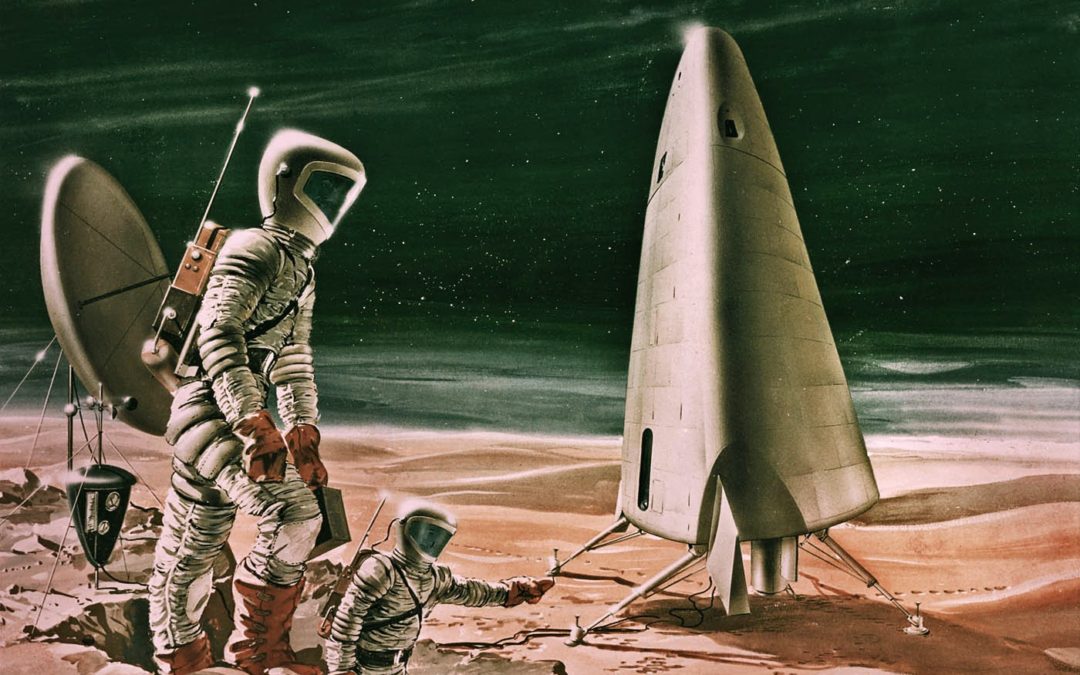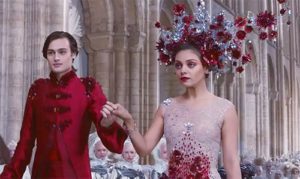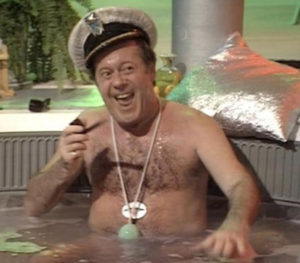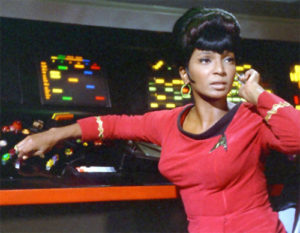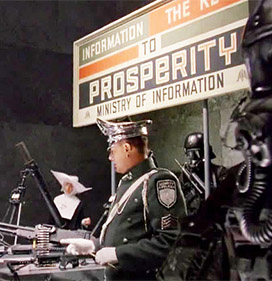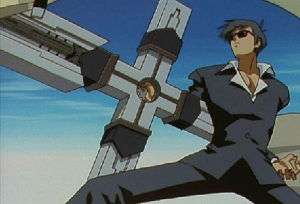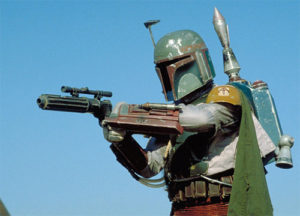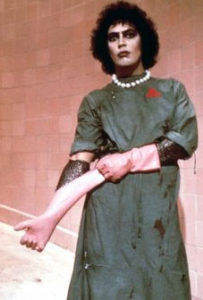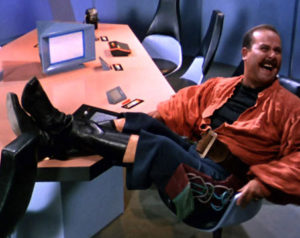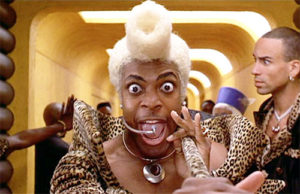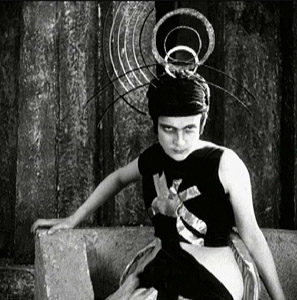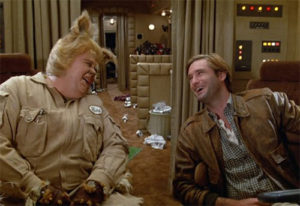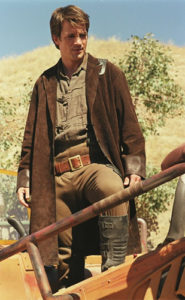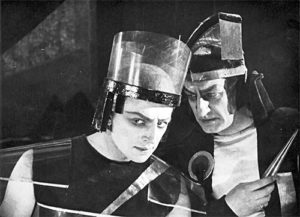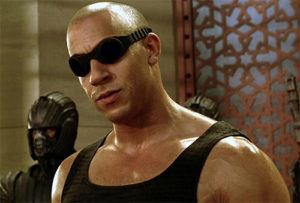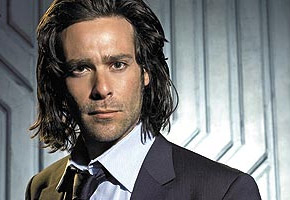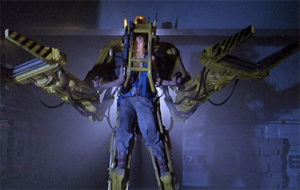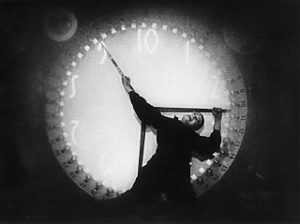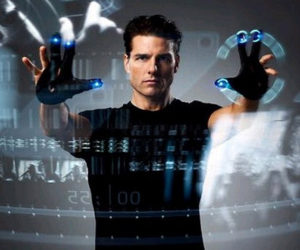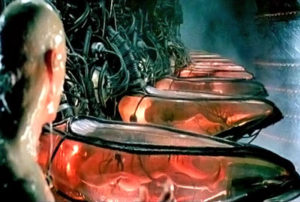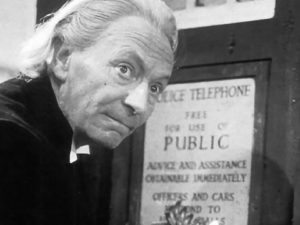Call this one a work-in-progress, a “comprehensive” list of character seeds, tropes, and concepts for sci-fi role-playing games, with some loose thematic order. Broadly these are within standard player character power levels, but…no promises. Some clusters lent themselves to orderly lists, others to more free-floating ideas. A bit of duplication and a lot of near-duplication, there’s no way to categorize these that’s going to work across the bord.
As I get around to refining this one, we’ll break it up into a few different columns: a list that’s curated for general use, and a list that’s more tailored to HSD campaigns. Theoretically, we’re going to expand this as we look at character roles within the major HSD megacorps more closely. But for now…have a list.
—Corbeau
It's About Power
Old Money: From a powerful spacefaring clan…Undiscovered heiress of star traders….I secretly bought the planet…Only the wealthy have access to life-extending immortality drugs…An ancient alien lizard people conspiracy controls the world and I am one such lizard. Jupiter Jones from “Jupiter Ascending,” who finds herself heir to the solar system and an interplanetary war. The background character from Sucharitkul’s Mallworld who wins a deep space shopping mall, and his descendants.
Political Clout: Future senator; political rising star; future dictator…Retired official….Planetary war hero (or converted war-hero-turned-activist)…Well-placed corp agent. Petty official in lynchpin position, say, in charge of supply requisitions Red-tape warrior: as a force for good, bureaucratic process can stall a hostile takeover or exploitative construction project. More often, the red tape warrior is major obstacle for another character.
The corpsman antagonist Parker Selfridge from “Avatar” fits this category.
The Captain: In many games, the ship is a central character on its own. The captain controls that central resource, and by extension, is shapes commerce and diplomacy in the campaign world. In the TRPG “Bulldogs” the captain is an environmental feature, a part of the campaign.
Captain flavors: Hypercompetent and noble but likely doomed…hypercompetent and inflexible with stick firmly up butt…the only one able to fly this damned alien ship…the last one standing in a conflict or crisis, refusing to back down against certain doom…the patsy who didn’t step backward fast enough and is stuck with the job (a good PC captain model…); incompetent political appointee…Captain as Diplomat (Will be an admiral in season two, FYI.)
The Face
The Face
“Face” is one of the standard PC party roles, the Speaker-to-NPCs. Charismatic, wordy, and willing to dig into a social mess with both hands.
Professional Diplomat: Conflict Negotiation Specialist (in a psi game, would naturally be the empath role of choice.)…hostage negotiator…inter-corp stunt accountant…Xenotranslator, stunt linguist (not necessarily an academic character, since academics aren’t natural “faces,” but it could happen.) Bren Cameron, protagonist of C.J. Cherryh’s “Foreigner” series, an iconic professional diplomat and translator.
Celebrity Expert: Often a charismatic scientist in the Neil deGrasse Tyson mode, but could be a faded explorer, or an anti-hero double agent. Dr. Gaius Boltar from Battlestar Galactica’s a great Celebrity Doctor and a strong charismatic villian…
The Beautiful People: Popular holo-star/musician (as much a social media experience as an artist)….Princess/Prince as diplomat (Should be taken hostage or married for political expediency by scene 3, max. The “Spoiled Royal” is a different creature, often used as challenging cargo for a transportation solutions party.)…Impossibly fragile gossamarine alien from a lightworld with a message of hope…
The Fixer: Sent by the Corp, the Resistance, or the Powers That Be to solve problems, frequently by building a crack team of experts. This role may or may not be a charismatic “face”, but they’ll be socially active.
Majordomo/Seneschal: Right-hand man and authorized representative, voice of the government/alien species/corp. His power is second-hand, but he wears it like a robe of office. On a good day, he balances the needs of the many and the demands of the few. On a bad day, his bribery rates are astronomical. See also: Voice of the Dying King…Speaker for the World Tree…Voice of the High Council… Agent Smith from The Matrix series is a Majordomo…sort of. Jake Sully, the male lead of Avatar, becomes a Majordomo type character as he begins to speak for his adopted planet.
Also, the con man, religious diplomat, infotainment journalist, spacelanes bard, Aristocracy-born, self-appointed god, PR Flack, and corp man might all make good Face types. The Captain is also a natural, if he isn’t distracted by duty.
Religious Tropes
Religious Tropes
Humanist Faith: “Religion” is not necessarily the arm of magical thinking: Gene Roddenberry’s perky Star Trek humanism and “Prime Directive” might also be spread with religious zeal, and the “Church” in Equilibrium had its own dark religious trappings (and the Resistance are fine humanistic Ideological Terrorists.)
The Do-Gooder Missionary: Travelling field medic in a war-torn world…Religious zealot showing a benighted people a bright new vision…Recently converted human priest of an alien god/visiting alien, bringing his strange new beliefs to a new world.
Ideological Terrorist: Fighting against the new world order; rebelling against a societal change that the greater culture has embraced. (Trope warning: usually the terrorists turn out to be sympathetic and oppressed characters.)
Magic/Technology with Robes: The secrets of magic, psy, or high tech are concealed and protected by religious orders. The Jedi Order is the go-to example of this, but Stasheff’s “Warlock” series features the Order of St. Vidicon of Cathode, who preserves sci-fi contemporary technology on a planet of anachronists.
Strange Theologies: A Priest, Monk, Missionary, Convert, Cultist, Cult-escapee, False Priest With Convincing Face, or Character Otherwise Built around the Strange Belief That:
- “A yet-to-be-developed technology will be the new god”
- “Artificial Intelligence is God”
- “The Progenitors or pre-apocalypse humans are gods or were gods”
- “Aliens are really god” (This combines well, or quite poorly, with Lovecraftian horror).
Science can be its own religion, particularly in 1950s Atomic Horror when it can blind its followers to the truth of giant radioactive monsters. The God Gambit character in “magic” below has religious notes, but is more of a con artist.
EUSA is a challenging post-apocalypse book which treats the pre-apocalyptic humans as sources of all wisdom. Asimov’s “The Last Question” raises some interesting questions about humanity and divinity.
Assorted Warriors
Assorted Warriors
Bounty Hunter Andgy anti-hero or vaguely sympathetic villain. It’s hard for this character to be black and white. Boba Fett’s one of the best-known bounty hunters, and later, the directors gave him a past so that he could be appropriately edgy and gray.
Mercenary/Soldier of Fortune Once in a while a merc treats his vocation as “just a job,” but “mercenary” is synonymous with a shifty and untrustworthy bastard; former loyalist burned by the Man; a former soldier who couldn’t pull the trigger. Nobody starts out life as a merc, it’s the archetypal fallen hero role.
HSD is a very “contracts”-driven game, with corp missions and shady assignments some of the big plot movers. As such, “mercenary” is one of the setting’s defaults.
Gun Expert Sniper…Military heavy ordinance…Blaster rifle fetishist; assassin…technically perfect gun martial art prodigy. Equilibrium‘s Gun Kata is the high water mark for firearms-based martial arts.
Space Trooper Iconic armored soldier type, moving in a swarm. Space marine; unnamed mook or dog-soldier, Member of mind-linked military/law force. Kaiju slugfest Pacific Rim had mindlinked mercenaries fighting giant monsters what’s not to love?
Battle-Scarred Veteran A trope which blurs into “war hero” at the edges. Telling them apart: the veteran is a burn-out, the war hero is a sell-out.
The Cops Space Patrol, Space Rangers, Corp Enforcers, High-Tech Android Officer.
The Professional Athlete, ideological terrorist, certain types of gadgeteers, barbarian warriors, and gritty and unstoppable killing machine also have warrior-like elements.
Scholars and Scientists
Scientists and Scholars
To a degree, ANY scientific character fits into a sci-fi universe. We’ll try to look at unusually qualified examples of the breed.
Inventor/Gadgeteer: Warp Gate technician or specialist…Artificial Intelligence creator, artificial life creator (insert awkward romance, murder spree, “of course he’s not alive”, plague of nanite goo, self-replicating horde, or “corrupted by hacker” complication here)
Certified Monsterologist: Xenobiologist, xenozoologist, xenoarcheologist, xenobotonist, or the modern era cryptozoologist who evolves into one of the previous by the end of the book.
Librarian/Archivist: The quieter version of the archeologist, tracking down documents and decrypting pre-war flash drives. May also be a linguist.
Linguist: A language specialist character, more often a side-skillset of the archeologist than a diplomatic role, as the scholarly linguist tends to be pale, hesitant, and stutters as he free-translates alien runes.
Note: There is no mechanic for alien and foreign languages in HSD, as the only unknown tongues are dead Earth languages, and the dark runes of the “Hydra” script. That’s kind of a character on its own.
The Charming Celebrity Expert can fit this role as well. The Brain Hacker and Pusher are both dark flipsides of the scientist role, and the retro-tech anachronism is, well, kind of a scientist.
Many aliens observing humanity fall into this category, by dint of their passions or superior tech. Many “indistinguishable from magic” characters begin as scientists before the author loses track of what science is.
Criminals and Low-Lifes
Criminals and Low-Lifes
Intrusion Specialist: Flexible and athletic thief-acrobat with a built-in stealth field and possible Chameleon Cloak…High-tech trigger-disarming gadgeteer…Sensor specialist,
Alien Double-Agent: Willingly serving the Other for personal gain or protection, or unwillingly blackmailed or mind-controlled into same. Once again, Battlestar Galactica’s Gaius Baltar is a great double-agent; so is Dark City’s Dr. Daniel Schreber (also a brain hacker).
Thief: In an era where information is the only real treasure, this one is interchangeable with hacker/spy. In a setting touched by war or with wide cultural/technological disparities, looters/plunderers/salvagers/freebooters/”antiquarians” may be common, pick your word.
Pusher: Pusher of strange alien drugs, mind-altering induction gadgets, widgets that short-circuit the pleasure center. The plot of Strange Days revolves around pusher-type characters at the turn of the 20th century.
The “Brain Hacker”: May be able to do any or all of the following: Implant an alien mind-control slug…read your dreams…extract your thoughts (and sell them to the highest bidder?)..Learn your secrets…Plant a self-destruct code…Plant a repressed memory of being a Martian secret agent…Or just give you weird hallucinations a bit like going down a tunnel filled with colored oils and water.
Gambler: The thrill-seeking, high-stakes gambler/gamer is a pretty much universal modern character
Con Artist: The universe will never be rid of the con artist, but in a space game, the “frontier” nature of the setting kind of invites him. Star Trek’s flamboyant Harry Mudd fits here well.
Spy: Intercorp espionage is big business…
Space Pirates: Maybe not the best model for a PC because of the volatility of evil parties, but any poorly-patrolled shipping lane is going to be thick with them. A “privateer” rebel fleet model working against the evil empire might work, I don’t think anyone’s done that.
Bounty Hunters are also common criminal types, and since HSD revolves around missions and contracts, also fit well into the game world. Truckers/smugglers, certain more acquisitive archeologist/scientists, and any trader that misread the local law can fall into these categories.
“Law” is flexible in HSD, depending entirely on who owns the city you’re currently in and how fast you had to run when your last contract went awry. The cloak-and-dagger Spyglass corp turns out a disproportionate number of criminal types, but nobody has a monopoly on technological terrorism. As the “default” corporation and likely one with low oversight, Marsco may have a lot of shady characters. This archetype may be more likely to go off the grid and live outside the corp system, perhaps in the catacombs of lower Phobos or an unrecorded Bluesky station.
Glitterati and Dilettantes
Glitterati and Dilettantes
Flamboyant and Excessive Celebrity: The Over-The-Top Infotainment Journalist; minimally competent Media Starlet placed by the corp as a possible mouthpiece or “face,” but likely not up to the job—doomed to crash and burn, or suffer a harsh redemption arch.. More a plot device than a character, the flamboyant celebrity archetype isn’t generally worth the oxygen they consume, and they consume a lot. “Ruby Rhod” from 5th Element, in particular, is “the lighter side of Pulse.”
The Backer: With more money than sense, the Backer is enthusiastic enough to be duped, and rich enough to be worth duping, but s/he is along for the ride. Flavors: Glittering young celebrity heiress and dilettante…Self-styled “adventurer” with more money than sense, possibly willing to fund a starship voyage out of his ridiculously deep pockets, if there’s a chance he can put his name on a new world. Dr. Doppler from “Treasure Planet“ is a great Backer character.
The Kid: “Kids” come in a few standard flavors: Gentle prodigy that is rapidly out of his element…Too young for the plague or alien process that brainwashed/killed his parents…Technological prodigy that transcends current tech limits entirely…annoying sidekick…and the related living McGuffin category (see “snowflakes,” below.)
The Seducer/Seductress: ….May or may not secretly have an alien living inside him/her…In an “underfunded rebellion” campaign may be an agent working against the bad guys from the inside…In a “hidden enemy” campaign, may be a cleverly-disguised robot or lizard-person. As a prostitute, the protagonist of the HSD novel Fate’s Fangs may fall into this category, at least at first.
High-Tech Artist: Master of holo-psy projections, a vibrational instrument that can somehow communicate with the antagonistic aliens, recreational fleshcrafting…usually too distracted, obsessed, or fatalistic to be a “Face” character.
Media Starlet: Possibly placed by The Corp as their future face in the area, but probably not up to the job. This particular pre-celebrity is doomed to crash and burn or suffer through a grueling redemption arch.
Drifters
Drifters
The Space Trucker/Smuggler: The trucker is a friendly version of the smuggler, or possibly just a smuggler who’s between gigs. “Trucker” implies a lighthearted character, but anyone that does endless merchant runs fills this niche. Smugglers are common ethically gray characters in HSD, a game world with lots of intercorp rivalry. The TRPG “Bulldogs” is based on space truckers and smugglers, and has some good ideas for lighthearted sci-fi. And raise a glass to the late Han Solo, Star Wars’s quintessential smuggler.
Spacelanes Bard: A rare character concept, but one that seems like a useful foil to the rootless nature of far-future settings and their tie to their creators and authors. Rhysling from “The Green Hills of Earth” (here, read by Leonard Nimoy) is the original space bard.
Hitchhiker/Stowaway: Comedy sci-fi canon “Hitchhiker’s Guide to the Galaxy” established this archetype. Rootless, shiftless, opportunistic, and able to turn up anywhere. could also be a sci-fi version of the construction day-worker, taking jobs wherever they’re available .Obviously, Ford Prefect is the quintessential galactic hitchhiker, but in many ways Doctor Who is another drifty, rootless character.
Tribal Youth: Particularly in dystopian settings, tribal raves and neo-primitive clans of orphaned youth are shorthand for lost freedom.
Drifters could be burnouts from any corporation or background (burned-out soldier, jaded zealot, failed celebrity…take any positive template and leave it in the sun too long. In HSD, squirrels and bears make great drifters, two species without strong racial identities or roles.
Anachronists
Anachronists
Technically, you could just add the word “space” to any modern or retro career, but let’s try and be sporting about this. Also, the traditional metaphor of “Space…the final frontier” lends itself well to certain anachronisms from the American West.
The Space Western: Very tied to a certain self-consciously retro setting, but a recurring trope. Space Marshals, Space Rangers, Space Frontier Settlers, all go hand in hand. Please see Sparks Nevada from The Thrilling Adventure Hour and Bravestarr from the early 80s Saturday Morning lineup, both full of campy characters—though Firefly has elements of this trope, too.
Aristocracy-Born: Tied to ancient land and ancient money, may be a voice from the planet-side powers, or scion of a merchant fleet. See also “influence and power” above, but this character might just be obsolete instead of powerful.
Retrotech Scientist/Engineer: Faithful speaker for an abandoned technology or debunked science (Orgone Energy, Phlogiston Physics, Ether, whatever) or may just be the only person in the city that can still fix…and play…that reel-to-reel deck.
20th Century Junkies: Retro-archeologist and possible pop-culture expert investigating Earth’s ancient past…Characters, confused robots, or cultures might have educated themselves off old video feeds or specific celebrities, as did the alien antagonists in Pixels…in a humorous post-apocalypse setting, the scavenging salvager might have a rich trove of memorabilia.
Barbarians: Little-known fact, entire planets are filled with blastersword-wielding barbarians on dinosaurs. 100% fact. See also Back-To-Nature types like neo-tribals, the fashionably post-apocalyptic street rats, 27th century Luddites protecting the world(s) from “dangerous” technologies.
Han Solo’s sidekick Chewbacca is arguably a barbarian throwback (he’s got a crossbow, doesn’t wear pants). Classic Star Trek and Doctor Who both raided the studio closets to create entire cultures of anachronisms. Stasheff’s “Warlock” series features a planet colonized by the Society of Creative Anachronism…an extreme example.
HSD is very pro-technology, without many anachronist types. “Longbow,” a bluesky station full of animal-shaped vectors living a romantically feral lifestyle of hunter and prey, is a rare “gem.” The humanist faith may also show some anachronist tendancies, and the Canidae lines that can trace themselves back to the first test tube projects 700 years ago may have some of the “modern aristocracy” in their makeup. But generally, HSD’s baseline assumption is there’s no strong reason to savor the past. Your world may vary.
Aliens and Outsiders
Aliens and Outsiders
Alien Observer: Alien diplomat…Alien outsider sociologist/zoologist studying humanity: may be a visible character—a sort of visiting professor, or a bumbling comedy foil. May be a hidden member of a conspiracy, as the aliens in “Dark City” were.
The Xenophile 1: “Aliens as pop-culture celebrity” fandom member or researcher…wanna-be copycat of our glowing space friends who so outshine us…Quisling human agents who side with the enemy
The Xenophile 2: Aliens as romantic interest, paraphilia, kink, forbidden or doomed love. Cross-species romance is a major note in Avatar.
Freedmen: Recently freed member of alien or off-world slave race. In HSD, the Mouse race shows off the “freed slave race” trope. The 90s series “Alien Nation” explores the theme to its fullest extent.
The Transformed: Converted to alien or part-alien by nanites, infection, space rays: District 9 combines this trope with the “alien refugee” concept.
The Last Creation of a Deceased Roboticist: A handy-workaround for “why aren’t there androids everywhere,” or “why is my android self-aware.” Data from Star Trek TNG is a strong android outsider that never quite turns insufferable. Edward Scissorhands has notes of this trope, too, as does the spooky post-apocalyptic animated film 9.
The Bio-Creation: Aesthetically perfect ideal…Stealth agent masquerading as human…sleeper agent…Persecuted minority race…Self-aware tool…Species as cash crop or food product.
The Survivor: Escapee from an alien predator…Infected escapee from an alien predator or plague…The one person who escaped the alien attack (but…why?)
Drifter-types and criminals work well as alien outsiders, too, left with no other option. Doctor Who may fit in this category, though I tend to view him as an unusually charismatic flavor of Special Snowflake.
Unique and Special Snowflakes
Unique and Special Snowflakes
The Living McGuffin: My genetic code contains the secret to curing the astro-plague…That glowing tattoo is the map to the galactic heart…I am the heir to a galactic empire…It’s a simple mission, just take the prince to his wedding in Sector 67m, what could go wrong?
The Gritty and Unstoppable Mercenary/Killing Machine/Assassin: Wolverine was the first, but Riddick is a more recent and particularly special snowflake.
Last Survivor of an Alien Race (that looks remarkably human)
The Tedious Newbie: Any alien or android character whose only button is “not understanding how society or technology works,” or “not getting human emotions.” This…is a bad character, best avoided. The “Sidekick Who Doesn’t Speak the Language” is a lighter version of this one, and may be safe to play. Just don’t play chess with one.
HSD really shouldn’t lend itself to special snowflakes, unless someone has to play an Owl. Truly unique creatures—pink dragons, hippogriffs, wolf-colored wolves—are just another test tube experiment, more pitiful than astonishing.
(Editorial comment: Don’t be a snowflake. Bad-ass Vin Deisel characters, alien scions, and One True Kings don’t play well in a nearly infinite universe, or at the gaming table.)
People We Love to Hate
People We Love To Hate
PR Flack: Marketing Guy (The corporate agent who issues all the terrible orders in “Avatar,” but probably redeems himself because he does have a conscience.
Reclamations: PCs who rent a ship or take too many advances for their missions may have to deal with collections agencies. Settings like HSD with abundant medical implants and surgeries might feature bio-collections antagonists like those Repo: The Genetic Opera.
Military Brass: Doogie Himler from Starship Troopers, every pompous antagonistic military character ever.
The Scientist/Scholar who Sold Out to the Aliens A Long Time Ago: Yes, I’ve used this one three times already. It’s my favorite trope.
Agent of the Corrupt System: …who might reform, a la “Equilibrium,” or might enjoy actually having power on tap, and stay corrupt.
The Exotic Wild Game Hunter: An entitled aristocrat with a blaster rifle…An adrenaline junkie with a well-developed rational for blowing away lesser life forms…A smuggler with a sideline in the interplanetary version of rhinoceros horns. In a universe with life forms that can’t communicate with each other or may not appear sentient, the concepts of “wild game” and “trophy hunting” can be made even darker.
Bounty Hunters, majordomos, and broadly the “criminal” category could fall into this category too, but they’d need to be really obnoxious about it.
PCs as villains? Not great for party balance and stability. But playing a character that represents the status quo can add to a game’s feeling of reality and place.
Spacers
Spacers
Asteroid/Station/“Bluesky” Native: Never seen the ground, lived life on a space station or asteroid base. May be a savvy techno-sophisticate lording it over the groundling bumpkins, or an abrasive rube adrift in a land-based aristocratic hell.
Ship-Born: As above, but likely a member of a merchant family, mining operation, or trading concern, born and lived in the metal confines of a ship. Related to the…
Generation Ship Passenger: The one guy left to pilot a ship filled with sleeping passengers and one strange intruder…Colonists blinking in the sun as they step off the ship their ancestors boarded 200 years ago…The crew of a ship that never saw earth and will never live to see their destination (and may or may not be aimed at a destination that exists). Netflix’s “Ascension” series plays this one well.
Refugee, Exile, Diasporan: A family, political faction, or species without a home. Titan A.E., Battlestar Galactica, and Hitchhiker’s Guide to the Galaxy take widely varying looks at the Refugee trope.
Much of the work of C.J. Cherryh addresses various flavors of “spacer,” as she’s very strong at building believable sci-fi cultures.
Day Jobs
Day Jobs
Bartender: Not a great adventurer role, but the “Callahan’s Crosstime Saloon” trope gave this one a home, and the huge amount of alcohol in “Hitchhiker’s Guide to the Galaxy” implies a vast culture of space bartenders.
Mechanic/Repair Specialist: Starship Repair Expert…Last-Ditch Resource at the Asteroid Base…Exotic Tech Repairman…the AI repair service…”How to Live Safely in a Science-Fictional World” is a complex time paradox novel about a time machine repairman.
The Medic: Optimistic and unworldly newbie…Overworked martyr with a heart of gold…jaded by year on the front lines…ill-equipped to deal with alien anatomy.
The Investigator: Hard-boiled detective…“Witch hunter” type looking for a hidden enemy (as seen in Logan’s Run, Equilibrium, Blade Runner)
Heavy Industry Worker: Reclamator – professional recycler/salvager, often operating in space to salvage from drifting space hulks. May be opposed to the archeologist, in a struggle of preservation vs. re-use…Asteroid miners, planetary ring harvesters. Bluth’s “Titan A.E.” has a great spacer salvage sequence.
Tourism/Travel Director: In an approximately infinite setting, someone has to facilitate the Celebrity Athletes and Idle Rich, help the missionaries scope out disadvantaged populations, and keep the space lanes somewhat free from pirates and vagrants.
The Corp Man could fall into this category, as could any bureaucrat, but a “day job” character should have a touch of the Everyman Hero about him.
Tech-Focused Tropes
Tech-Focused Tropes
The Starship Pilot: Like the ice cream, 31 flavors… The Ace Starship Pilot…The Rookie Pilot…The Prescient Navigator..The Funny Alien Co-Pilot
Remote Operations Specialist: Hacker who manifests in holograms…Drone operator…A Cyberpunk web-exploring cybernaut…
Armorer/Weaponsmith: Not quite as versatile as the inventor, but flashier. Post-apocalypse combat modding vehical specialist… munitions supplier…illegal weapons double-dealer…James Bond’s “Q”
Data Security Specialist/Hacker White hat…Uncatchable criminal…Government/Corp sponsored espionage agent. Touched on in the “criminal” section above, but against technically superior opponents or “energy beings,” may be the saviors of mankind. In a dystopian setting, hackers make reliable heroes.
Augmented Freaks
Augmented Freaks
Augmented Tough: The implant-heavy street samurai…Augmented wasteland warrior/survivor..The Giant (not a concept per se but the truly massive brute warrior is a common enough figure in fantasy/sci-fi battles, and HSD supports “macro” characters)
The Enhanced Athlete
Replicate #4: One of a series of identical characters, likely breaking the lockstep and searching for a unique identity…Penitent Storm Trooper..”Skin Job” alien whose stealth mission is compromised by love…an awakened AI…Last year’s model: mass-produced “look” that’s a bit too much like the other well-heeled lookalikes.
Indistinguishable From Magic
Indistinguishable from Magic
Time-Travel Characters: The immortal alien gadgeteer..The Veteran of the Forever War, striving to change the future or tormented by a future he can’t avoid.
Psychics, Sensitives, Empaths: “Psychic” is a standard in older sci-fi, when the concept was accepted as a possible science path. It’s not supported in HSD meaningfully, although a powerful set of social skills might simulate it.
The God Gambit: a pair of con artists pose as god/supernaturals to steal a “primitive” culture’s artifacts; agents of the Noble Federation plant a “divine” figure to uplift, convert, or save a culture.” “Sky Coyote” tells the story of a high-tech rescuer given the form of the god Coyote to preserve an alien culture.
Empathic Pilot: A pilot whose skill derives from mechanical empathy or a special bond with a unique machine (say, a mecha), a class of machines (alien technology that he somehow understands), or all machines (mechanopathy may be a bit more deep magic/space superheroes than your universe allows)
Technomage: Technoshaman, technomancer, nanite-based miracle worker.
The Luck Guy: Cursed survivor of a dozen wars…space-station surviving jinx…seventh generation of the “permission to breed” lottery inadvertently bred for luck…any “weirdness magnet.” HSD doesn’t natively support “magic” but this is a common enough trope, and “luck” is easier to swallow than “Sorcery.” Larry Niven’s “Ringworld” has a “luck breeding program” character.
“Occult” Investigator: Alien emanations are the basis for ghost stories…Agent hides advanced technology behind a veneer of the occult…Old-school alien hunter…Psychic investigator or sensitive
All of these press the limits of magic and technology, and may not be appropriate as PCs.
It's About Power
Old Money: From a powerful spacefaring clan…Undiscovered heiress of star traders….I secretly bought the planet…Only the wealthy have access to life-extending immortality drugs…An ancient alien lizard people conspiracy controls the world and I am one such lizard.
In HSD, many Canines can trace their legacy back to the first Vector test tubes, 700-something years ago, and they may or may not have ancestral clout. Further back, anyone who can draw from the pre-vector world may carry some serious weight.
Jupiter Jones from “Jupiter Ascending,” who finds herself heir to the solar system and an interplanetary war. The background character from Sucharitkul’s Mallworld who wins a deep space shopping mall, and his descendants.
Political Clout: Future senator; political rising star; future dictator…Retired official….Planetary war hero (or converted war-hero-turned-activist)…Well-placed corp agent. Petty official in lynchpin position, say, in charge of supply requisitions Red-tape warrior: as a force for good, bureaucratic process can stall a hostile takeover or exploitative construction project. More often, the red tape warrior is major obstacle for another character.
The corpsman antagonist Parker Selfridge from “Avatar” fits this category.
The Captain: In many games, the ship is a central character on its own. The captain controls that central resource, and by extension, is shapes commerce and diplomacy in the campaign world. In the TRPG “Bulldogs” the captain is an environmental feature, a part of the campaign.
Captain flavors: Hypercompetent and noble but likely doomed…hypercompetent and inflexible with stick firmly up butt…the only one able to fly this damned alien ship…the last one standing in a conflict or crisis, refusing to back down against certain doom…the patsy who didn’t step backward fast enough and is stuck with the job (a good PC captain model…); incompetent political appointee…Captain as Diplomat (Will be an admiral in season two, FYI.)
The Face
The Face
“Face” is one of the standard PC party roles, the Speaker-to-NPCs. Charismatic, wordy, and willing to dig into a social mess with both hands.
Professional Diplomat: Conflict Negotiation Specialist (in a psi game, would naturally be the empath role of choice.)…hostage negotiator…inter-corp stunt accountant…Xenotranslator, stunt linguist (not necessarily an academic character, since academics aren’t natural “faces,” but it could happen.)
HSD doesn’t have a “language” skill, so the translator-diplomat may be off the table, or more of a character quirk than identity. Your campaign may vary if linguistic drift or alien cultures are invoked.
Bren Cameron, protagonist of C.J. Cherryh’s “Foreigner” series, an iconic professional diplomat and translator.
Celebrity Expert: Often a charismatic scientist in the Neil deGrasse Tyson mode, but could be a faded explorer, or an anti-hero double agent. Dr. Gaius Boltar from Battlestar Galactica’s a great Celebrity Doctor and a strong charismatic villian…
The Beautiful People: Popular holo-star/musician (as much a social media experience as an artist)….Princess/Prince as diplomat (Should be taken hostage or married for political expediency by scene 3, max. The “Spoiled Royal” is a different creature, often used as challenging cargo for a transportation solutions party.)…Impossibly fragile gossamarine alien from a lightworld with a message of hope…
The Fixer: Sent by the Corp, the Resistance, or the Powers That Be to solve problems, frequently by building a crack team of experts. This role may or may not be a charismatic “face”, but they’ll be socially active.
Majordomo/Seneschal: Right-hand man and authorized representative, voice of the government/alien species/corp. His power is second-hand, but he wears it like a robe of office. On a good day, he balances the needs of the many and the demands of the few. On a bad day, his bribery rates are astronomical. See also: Voice of the Dying King…Speaker for the World Tree…Voice of the High Council… Agent Smith from The Matrix series is a Majordomo…sort of. Jake Sully, the male lead of Avatar, becomes a Majordomo type character as he begins to speak for his adopted planet.
Also, the con man, religious diplomat, infotainment journalist, spacelanes bard, Aristocracy-born, self-appointed god, PR Flack, and corp man might all make good Face types. The Captain is also a natural, if he isn’t distracted by duty.
In HSD, two megacorps stand out here: Progenitus, who do brisk business in missionary aid and public service, and Pulse, who’re built around the Los Angeles/Hollywood model.
Religious Tropes
Religious Tropes
Humanist Faith: “Religion” is not necessarily the arm of magical thinking: Gene Roddenberry’s perky Star Trek humanism and “Prime Directive” might also be spread with religious zeal, and the “Church” in Equilibrium had its own dark religious trappings (and the Resistance are fine humanistic Ideological Terrorists.)
The Do-Gooder Missionary: Travelling field medic in a war-torn world…Religious zealot showing a benighted people a bright new vision…Recently converted human priest of an alien god/visiting alien, bringing his strange new beliefs to a new world.
Ideological Terrorist: Fighting against the new world order; rebelling against a societal change that the greater culture has embraced. (Trope warning: usually the terrorists turn out to be sympathetic and oppressed characters.)
Magic/Technology with Robes: The secrets of magic, psy, or high tech are concealed and protected by religious orders. The Jedi Order is the go-to example of this, but Stasheff’s “Warlock” series features the Order of St. Vidicon of Cathode, who preserves sci-fi contemporary technology on a planet of anachronists.
Strange Theologies: A Priest, Monk, Missionary, Convert, Cultist, Cult-escapee, False Priest With Convincing Face, or Character Otherwise Built around the Strange Belief That:
- “A yet-to-be-developed technology will be the new god”
- “Artificial Intelligence is God”
- “The Progenitors or pre-apocalypse humans are gods or were gods”
- “Aliens are really god” (This combines well, or quite poorly, with Lovecraftian horror).
In HSD there’s not a lot of religion flying around space, but the Progenitus Corp’s crusading mentality fills that particular void well. There’s suggestions of the Church of Technology as a growing movement, and Transcendent Technologies/the “Whispers” suggest the possibility of a faintly Lovecraftian paganism growing up around the strange 4th-dimensional world the Vectors are slowly drifting toward.
Science can be its own religion, particularly in 1950s Atomic Horror when it can blind its followers to the truth of giant radioactive monsters. The God Gambit character in “magic” below has religious notes, but is more of a con artist.
“EUSA” is a challenging post-apocalypse book which treats the pre-apocalyptic humans as sources of all wisdom (SOAW). Asimov’s “The Last Question” raises some interesting questions about humanity and divinity.
Assorted Warriors
Assorted Warriors
Bounty Hunter Andgy anti-hero or vaguely sympathetic villain. It’s hard for this character to be black and white. Boba Fett’s one of the best-known bounty hunters, and later, the directors gave him a past so that he could be appropriately edgy and gray.
Mercenary/Soldier of Fortune Once in a while a merc treats his vocation as “just a job,” but “mercenary” is synonymous with a shifty and untrustworthy bastard; former loyalist burned by the Man; a former soldier who couldn’t pull the trigger. Nobody starts out life as a merc, it’s the archetypal fallen hero role.
HSD is a very “contracts”-driven game, with corp missions and shady assignments some of the big plot movers. As such, “mercenary” is one of the setting’s defaults.
Gun Expert Sniper…Military heavy ordinance…Blaster rifle fetishist; assassin…technically perfect gun martial art prodigy. Equilibrium‘s Gun Kata is the high water mark for firearms-based martial arts.
Space Trooper Iconic armored soldier type, moving in a swarm. Space marine; unnamed mook or dog-soldier, Member of mind-linked military/law force. Kaiju slugfest Pacific Rim had mindlinked mercenaries fighting giant monsters what’s not to love?
Battle-Scarred Veteran A trope which blurs into “war hero” at the edges. Telling them apart: the veteran is a burn-out, the war hero is a sell-out.
The Cops Space Patrol, Space Rangers, Corp Enforcers, High-Tech Android Officer.
In HSD, the Inner Ring Police Force (IRPF) has the monopoly on this role, but the typical heroic warrior type could come from the muscle vats and training fields of Pulse, as well. “Robocop” could easily have been a propaganda piece for the ASR robotics group. In an ironic twist, Spyglass’s ruthless enforcement of free trade could create a police force that never, ever plays “good cop/bad cop.”
HSD isn’t a game about mass slaughter…theoretically. A purely kill-based character may go against the spirit of your game, or at least change its tone significantly. Or worse, just be unrewarding as a PC.
The Professional Athlete, ideological terrorist, certain types of gadgeteers, barbarian warriors, and gritty and unstoppable killing machine also have warrior-like elements.
Scholars and Scientists
Scientists and Scholars
To a degree, ANY scientific character fits into a sci-fi universe. We’ll try to look at unusually qualified examples of the breed.
Inventor/Gadgeteer: Warp Gate technician or specialist…Artificial Intelligence creator, artificial life creator (insert awkward romance, murder spree, “of course he’s not alive”, plague of nanite goo, self-replicating horde, or “corrupted by hacker” complication here)
Certified Monsterologist: Xenobiologist, xenozoologist, xenoarcheologist, xenobotonist, or the modern era cryptozoologist who evolves into one of the previous by the end of the book.
Librarian/Archivist: The quieter version of the archeologist, tracking down documents and decrypting pre-war flash drives. May also be a linguist.
Linguist: A language specialist character, more often a side-skillset of the archeologist than a diplomatic role, as the scholarly linguist tends to be pale, hesitant, and stutters as he free-translates alien runes.
Note: There is no mechanic for alien and foreign languages in HSD, as the only unknown tongues are dead Earth languages, and the dark runes of the “Hydra” script. That’s kind of a character on its own.
The Charming Celebrity Expert can fit this role as well. The Brain Hacker and Pusher are both dark flipsides of the scientist role, and the retro-tech anachronism is, well, kind of a scientist.
Many aliens observing humanity fall into this category, by dint of their passions or superior tech. Many “indistinguishable from magic” characters begin as scientists before the author loses track of what science is.
No megacorp has the monopoly on science and research, but ASR (Robotics), TTI (Weird Science), and Progenitus (Medical Science) at least have strong claims on it.
Criminals and Low-Lifes
Criminals and Low-Lifes
Intrusion Specialist: Flexible and athletic thief-acrobat with a built-in stealth field and possible Chameleon Cloak…High-tech trigger-disarming gadgeteer…Sensor specialist,
Alien Double-Agent: Willingly serving the Other for personal gain or protection, or unwillingly blackmailed or mind-controlled into same. Once again, Battlestar Galactica’s Gaius Baltar is a great double-agent; so is Dark City’s Dr. Daniel Schreber (also a brain hacker).
Thief: In an era where information is the only real treasure, this one is interchangeable with hacker/spy. In a setting touched by war or with wide cultural/technological disparities, looters/plunderers/salvagers/freebooters/”antiquarians” may be common, pick your word.
Pusher: Pusher of strange alien drugs, mind-altering induction gadgets, widgets that short-circuit the pleasure center. The plot of Strange Days revolves around pusher-type characters at the turn of the 20th century.
The “Brain Hacker”: May be able to do any or all of the following: Implant an alien mind-control slug…read your dreams…extract your thoughts (and sell them to the highest bidder?)..Learn your secrets…Plant a self-destruct code…Plant a repressed memory of being a Martian secret agent…Or just give you weird hallucinations a bit like going down a tunnel filled with colored oils and water.
Gambler: The thrill-seeking, high-stakes gambler/gamer is a pretty much universal modern character
Con Artist: The universe will never be rid of the con artist, but in a space game, the “frontier” nature of the setting kind of invites him. Star Trek’s flamboyant Harry Mudd fits here well.
Spy: Intercorp espionage is big business…
Space Pirates: Maybe not the best model for a PC because of the volatility of evil parties, but any poorly-patrolled shipping lane is going to be thick with them. A “privateer” rebel fleet model working against the evil empire might work, I don’t think anyone’s done that.
Bounty Hunters are also common criminal types, and since HSD revolves around missions and contracts, also fit well into the game world. Truckers/smugglers, certain more acquisitive archeologist/scientists, and any trader that misread the local law can fall into these categories.
“Law” is flexible in HSD, depending entirely on who owns the city you’re currently in and how fast you had to run when your last contract went awry. The cloak-and-dagger Spyglass corp turns out a disproportionate number of criminal types, but nobody has a monopoly on technological terrorism. As the “default” corporation and likely one with low oversight, Marsco may have a lot of shady characters. This archetype may be more likely to go off the grid and live outside the corp system, perhaps in the catacombs of lower Phobos or an unrecorded Bluesky station.
Glitterati and Dilettantes
Glitterati and Dilettantes
Flamboyant and Excessive Celebrity: The Over-The-Top Infotainment Journalist; minimally competent Media Starlet placed by the corp as a possible mouthpiece or “face,” but likely not up to the job—doomed to crash and burn, or suffer a harsh redemption arch.. More a plot device than a character, the flamboyant celebrity archetype isn’t generally worth the oxygen they consume, and they consume a lot. “Ruby Rhod” from 5th Element, in particular, is “the lighter side of Pulse.”
The Backer: With more money than sense, the Backer is enthusiastic enough to be duped, and rich enough to be worth duping, but s/he is along for the ride. Flavors: Glittering young celebrity heiress and dilettante…Self-styled “adventurer” with more money than sense, possibly willing to fund a starship voyage out of his ridiculously deep pockets, if there’s a chance he can put his name on a new world. Dr. Doppler from “Treasure Planet“ is a great Backer character.
The Kid: “Kids” come in a few standard flavors: Gentle prodigy that is rapidly out of his element…Too young for the plague or alien process that brainwashed/killed his parents…Technological prodigy that transcends current tech limits entirely…annoying sidekick…and the related living McGuffin category (see “snowflakes,” below.)
The Seducer/Seductress: ….May or may not secretly have an alien living inside him/her…In an “underfunded rebellion” campaign may be an agent working against the bad guys from the inside…In a “hidden enemy” campaign, may be a cleverly-disguised robot or lizard-person. As a prostitute, the protagonist of the HSD novel Fate’s Fangs may fall into this category, at least at first.
High-Tech Artist: Master of holo-psy projections, a vibrational instrument that can somehow communicate with the antagonistic aliens, recreational fleshcrafting…usually too distracted, obsessed, or fatalistic to be a “Face” character.
Media Starlet: Possibly placed by The Corp as their future face in the area, but probably not up to the job. This particular pre-celebrity is doomed to crash and burn or suffer through a grueling redemption arch.
In HSD, the Pulse corporation owns this category, though Marsco’s endless supply of dilettantes comes in at a close second. The concept of “beautiful people” characters is just a bit challenged in a world of constant genetic augmentation and elective surgery. Some particularly sexy modifications come in and out of style, with weird color schemes, antlers, and double tails all having their 15 minutes of fame. Regardless, access to this surgery is a defining marker of “haves” vs. “have-nots.”
Drifters
Drifters
The Space Trucker/Smuggler: The trucker is a friendly version of the smuggler, or possibly just a smuggler who’s between gigs. “Trucker” implies a lighthearted character, but anyone that does endless merchant runs fills this niche. Smugglers are common ethically gray characters in HSD, a game world with lots of intercorp rivalry. The TRPG “Bulldogs” is based on space truckers and smugglers, and has some good ideas for lighthearted sci-fi. And raise a glass to the late Han Solo, Star Wars’s quintessential smuggler.
Spacelanes Bard: A rare character concept, but one that seems like a useful foil to the rootless nature of far-future settings and their tie to their creators and authors. Rhysling from “The Green Hills of Earth” (here, read by Leonard Nimoy) is the original space bard.
Hitchhiker/Stowaway: Comedy sci-fi canon “Hitchhiker’s Guide to the Galaxy” established this archetype. Rootless, shiftless, opportunistic, and able to turn up anywhere. could also be a sci-fi version of the construction day-worker, taking jobs wherever they’re available .Obviously, Ford Prefect is the quintessential galactic hitchhiker, but in many ways Doctor Who is another drifty, rootless character.
Tribal Youth: Particularly in dystopian settings, tribal raves and neo-primitive clans of orphaned youth are shorthand for lost freedom.
Drifters could be burnouts from any corporation or background (burned-out soldier, jaded zealot, failed celebrity…take any positive template and leave it in the sun too long. In HSD, squirrels and bears make great drifters, two species without strong racial identities or roles.
Anachronists
Anachronists
Technically, you could just add the word “space” to any modern or retro career, but let’s try and be sporting about this. Also, the traditional metaphor of “Space…the final frontier” lends itself well to certain anachronisms from the American West.
The Space Western: Very tied to a certain self-consciously retro setting, but a recurring trope. Space Marshals, Space Rangers, Space Frontier Settlers, all go hand in hand. Please see Sparks Nevada from The Thrilling Adventure Hour and Bravestarr from the early 80s Saturday Morning lineup, both full of campy characters—though Firefly has elements of this trope, too.
Aristocracy-Born: Tied to ancient land and ancient money, may be a voice from the planet-side powers, or scion of a merchant fleet. See also “influence and power” above, but this character might just be obsolete instead of powerful.
Retrotech Scientist/Engineer: Faithful speaker for an abandoned technology or debunked science (Orgone Energy, Phlogiston Physics, Ether, whatever) or may just be the only person in the city that can still fix…and play…that reel-to-reel deck.
20th Century Junkies: Retro-archeologist and possible pop-culture expert investigating Earth’s ancient past…Characters, confused robots, or cultures might have educated themselves off old video feeds or specific celebrities, as did the alien antagonists in Pixels…in a humorous post-apocalypse setting, the scavenging salvager might have a rich trove of memorabilia.
Barbarians: Little-known fact, entire planets are filled with blastersword-wielding barbarians on dinosaurs. 100% fact. See also Back-To-Nature types like neo-tribals, the fashionably post-apocalyptic street rats, 27th century Luddites protecting the world(s) from “dangerous” technologies.
Han Solo’s sidekick Chewbacca is arguably a barbarian throwback (he’s got a crossbow, doesn’t wear pants). Classic Star Trek and Doctor Who both raided the studio closets to create entire cultures of anachronisms. Stasheff’s “Warlock” series features a planet colonized by the Society of Creative Anachronism…an extreme example.
HSD is very pro-technology, without many anachronist types. “Longbow,” a bluesky station full of animal-shaped vectors living a romantically feral lifestyle of hunter and prey, is a rare “gem.” The humanist faith may also show some anachronist tendancies, and the Canidae lines that can trace themselves back to the first test tube projects 700 years ago may have some of the “modern aristocracy” in their makeup. But generally, HSD’s baseline assumption is there’s no strong reason to savor the past. Your world may vary.
Aliens and Outsiders
Aliens and Outsiders
Alien Observer: Alien diplomat…Alien outsider sociologist/zoologist studying humanity: may be a visible character—a sort of visiting professor, or a bumbling comedy foil. May be a hidden member of a conspiracy, as the aliens in “Dark City” were.
The Xenophile 1: “Aliens as pop-culture celebrity” fandom member or researcher…wanna-be copycat of our glowing space friends who so outshine us…Quisling human agents who side with the enemy
The Xenophile 2: Aliens as romantic interest, paraphilia, kink, forbidden or doomed love. Cross-species romance is a major note in Avatar.
Freedmen: Recently freed member of alien or off-world slave race. In HSD, the Mouse race shows off the “freed slave race” trope. The 90s series “Alien Nation” explores the theme to its fullest extent.
The Transformed: Converted to alien or part-alien by nanites, infection, space rays: District 9 combines this trope with the “alien refugee” concept.
The Last Creation of a Deceased Roboticist: A handy-workaround for “why aren’t there androids everywhere,” or “why is my android self-aware.” Data from Star Trek TNG is a strong android outsider that never quite turns insufferable. Edward Scissorhands has notes of this trope, too, as does the spooky post-apocalyptic animated film 9.
The Bio-Creation: Aesthetically perfect ideal…Stealth agent masquerading as human…sleeper agent…Persecuted minority race…Self-aware tool…Species as cash crop or food product.
The Survivor: Escapee from an alien predator…Infected escapee from an alien predator or plague…The one person who escaped the alien attack (but…why?)
Drifter-types and criminals work well as alien outsiders, too, left with no other option. Doctor Who may fit in this category, though I tend to view him as an unusually charismatic flavor of Special Snowflake.
In some ways, HSD doesn’t have a strong alien presence, since most antagonists are Vectors like the PCs. HSD Expanded lists a few oddball races: the Exonymphs and Cogsunes, which come close to being true aliens. Most other alien entities are hostile in HSD’s “Sol” system. That being said, particularly far-out locals like Emphyrean, the Bluesky base stuffed full of “mythic” Vectors, might drift culturally enough to become alien to a more down-to-mars society.
Unique and Special Snowflakes
Unique and Special Snowflakes
The Living McGuffin: My genetic code contains the secret to curing the astro-plague…That glowing tattoo is the map to the galactic heart…I am the heir to a galactic empire…It’s a simple mission, just take the prince to his wedding in Sector 67m, what could go wrong?
The Gritty and Unstoppable Mercenary/Killing Machine/Assassin: Wolverine was the first, but Riddick is a more recent and particularly special snowflake.
Last Survivor of an Alien Race (that looks remarkably human)
The Tedious Newbie: Any alien or android character whose only button is “not understanding how society or technology works,” or “not getting human emotions.” This…is a bad character, best avoided. The “Sidekick Who Doesn’t Speak the Language” is a lighter version of this one, and may be safe to play. Just don’t play chess with one.
HSD really shouldn’t lend itself to special snowflakes, unless someone has to play an Owl. Truly unique creatures—pink dragons, hippogriffs, wolf-colored wolves—are just another test tube experiment, more pitiful than astonishing.
(Editorial comment: Don’t be a snowflake. Bad-ass Vin Deisel characters, alien scions, and One True Kings don’t play well in a nearly infinite universe, or at the gaming table.)
People We Love to Hate
People We Love To Hate
PR Flack: Marketing Guy (The corporate agent who issues all the terrible orders in “Avatar,” but probably redeems himself because he does have a conscience.
Reclamations: PCs who rent a ship or take too many advances for their missions may have to deal with collections agencies. Settings like HSD with abundant medical implants and surgeries might feature bio-collections antagonists like those Repo: The Genetic Opera.
Military Brass: Doogie Himler from Starship Troopers, every pompous antagonistic military character ever.
The Scientist/Scholar who Sold Out to the Aliens A Long Time Ago: Yes, I’ve used this one three times already. It’s my favorite trope.
Agent of the Corrupt System: …who might reform, a la “Equilibrium,” or might enjoy actually having power on tap, and stay corrupt.
The Exotic Wild Game Hunter: An entitled aristocrat with a blaster rifle…An adrenaline junkie with a well-developed rational for blowing away lesser life forms…A smuggler with a sideline in the interplanetary version of rhinoceros horns. In a universe with life forms that can’t communicate with each other or may not appear sentient, the concepts of “wild game” and “trophy hunting” can be made even darker.
Bounty Hunters, majordomos, and broadly the “criminal” category could fall into this category too, but they’d need to be really obnoxious about it.
PCs as villains? Not great for party balance and stability. But playing a character that represents the status quo can add to a game’s feeling of reality and place.
Spacers
Spacers
Asteroid/Station/“Bluesky” Native: Never seen the ground, lived life on a space station or asteroid base. May be a savvy techno-sophisticate lording it over the groundling bumpkins, or an abrasive rube adrift in a land-based aristocratic hell.
Ship-Born: As above, but likely a member of a merchant family, mining operation, or trading concern, born and lived in the metal confines of a ship. Related to the…
Generation Ship Passenger: The one guy left to pilot a ship filled with sleeping passengers and one strange intruder…Colonists blinking in the sun as they step off the ship their ancestors boarded 200 years ago…The crew of a ship that never saw earth and will never live to see their destination (and may or may not be aimed at a destination that exists). Netflix’s “Ascension” series plays this one well.
Refugee, Exile, Diasporan: A family, political faction, or species without a home. Titan A.E., Battlestar Galactica, and Hitchhiker’s Guide to the Galaxy take widely varying looks at the Refugee trope.
Much of the work of C.J. Cherryh addresses various flavors of “spacer,” as she’s very strong at building believable sci-fi cultures.
HSD’s default setting assumes a certain level of contact with Mars and Venus, but it allows for spacer experiences. There’s no shortage of grottos and Bluesky societies that have drifted from their cultural norms, and 700 years of lost expeditions to recover.
Day Jobs
Day Jobs
Bartender: Not a great adventurer role, but the “Callahan’s Crosstime Saloon” trope gave this one a home, and the huge amount of alcohol in “Hitchhiker’s Guide to the Galaxy” implies a vast culture of space bartenders.
Mechanic/Repair Specialist: Starship Repair Expert…Last-Ditch Resource at the Asteroid Base…Exotic Tech Repairman…the AI repair service…”How to Live Safely in a Science-Fictional World” is a complex time paradox novel about a time machine repairman.
The Medic: Optimistic and unworldly newbie…Overworked martyr with a heart of gold…jaded by year on the front lines…ill-equipped to deal with alien anatomy.
The Investigator: Hard-boiled detective…“Witch hunter” type looking for a hidden enemy (as seen in Logan’s Run, Equilibrium, Blade Runner)
Heavy Industry Worker: Reclamator – professional recycler/salvager, often operating in space to salvage from drifting space hulks. May be opposed to the archeologist, in a struggle of preservation vs. re-use…Asteroid miners, planetary ring harvesters. Bluth’s “Titan A.E.” has a great spacer salvage sequence.
Tourism/Travel Director: In an approximately infinite setting, someone has to facilitate the Celebrity Athletes and Idle Rich, help the missionaries scope out disadvantaged populations, and keep the space lanes somewhat free from pirates and vagrants.
The Corp Man could fall into this category, as could any bureaucrat, but a “day job” character should have a touch of the Everyman Hero about him.
Tech-Focused Tropes
Tech-Focused Tropes
The Starship Pilot: Like the ice cream, 31 flavors… The Ace Starship Pilot…The Rookie Pilot…The Prescient Navigator..The Funny Alien Co-Pilot
Remote Operations Specialist: Hacker who manifests in holograms…Drone operator…A Cyberpunk web-exploring cybernaut…
Armorer/Weaponsmith: Not quite as versatile as the inventor, but flashier. Post-apocalypse combat modding vehical specialist… munitions supplier…illegal weapons double-dealer…James Bond’s “Q”
Data Security Specialist/Hacker White hat…Uncatchable criminal…Government/Corp sponsored espionage agent. Touched on in the “criminal” section above, but against technically superior opponents or “energy beings,” may be the saviors of mankind. In a dystopian setting, hackers make reliable heroes.
Augmented Freaks
Augmented Freaks
Augmented Tough: The implant-heavy street samurai…Augmented wasteland warrior/survivor..The Giant (not a concept per se but the truly massive brute warrior is a common enough figure in fantasy/sci-fi battles, and HSD supports “macro” characters)
The Enhanced Athlete
Replicate #4: One of a series of identical characters, likely breaking the lockstep and searching for a unique identity…Penitent Storm Trooper..”Skin Job” alien whose stealth mission is compromised by love…an awakened AI…Last year’s model: mass-produced “look” that’s a bit too much like the other well-heeled lookalikes.
Indistinguishable From Magic
Indistinguishable from Magic
Time-Travel Characters: The immortal alien gadgeteer..The Veteran of the Forever War, striving to change the future or tormented by a future he can’t avoid.
Psychics, Sensitives, Empaths: “Psychic” is a standard in older sci-fi, when the concept was accepted as a possible science path. It’s not supported in HSD meaningfully, although a powerful set of social skills might simulate it.
The God Gambit: a pair of con artists pose as god/supernaturals to steal a “primitive” culture’s artifacts; agents of the Noble Federation plant a “divine” figure to uplift, convert, or save a culture.” “Sky Coyote” tells the story of a high-tech rescuer given the form of the god Coyote to preserve an alien culture.
Empathic Pilot: A pilot whose skill derives from mechanical empathy or a special bond with a unique machine (say, a mecha), a class of machines (alien technology that he somehow understands), or all machines (mechanopathy may be a bit more deep magic/space superheroes than your universe allows)
Technomage: Technoshaman, technomancer, nanite-based miracle worker.
The Luck Guy: Cursed survivor of a dozen wars…space-station surviving jinx…seventh generation of the “permission to breed” lottery inadvertently bred for luck…any “weirdness magnet.” HSD doesn’t natively support “magic” but this is a common enough trope, and “luck” is easier to swallow than “Sorcery.” Larry Niven’s “Ringworld” has a “luck breeding program” character.
“Occult” Investigator: Alien emanations are the basis for ghost stories…Agent hides advanced technology behind a veneer of the occult…Old-school alien hunter…Psychic investigator or sensitive
All of these press the limits of magic and technology, and may not be appropriate as PCs. Transcendent Technology and the ideas surrounding it open up the possibility of tech-as-magic characters in a big way, and are new enough to still have some of the golly-gee-whiz factor of old-school sci-fi. Almost as importantly as the technology itself is the concept of layered alternate realities they draw from, which is about as close to magic as “science” can get.
Any more ideas? Taxonomies? Examples? Please share, and we’ll update the list!
